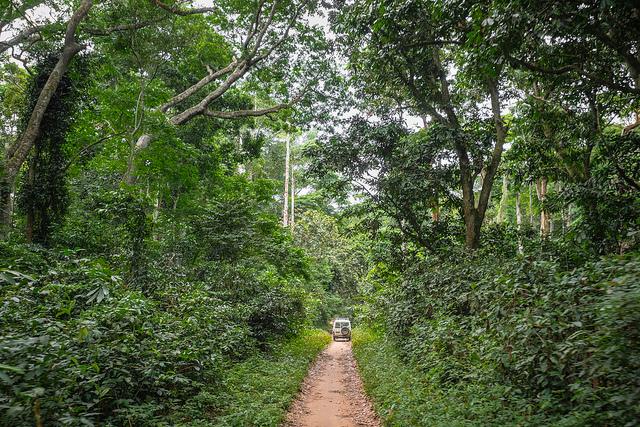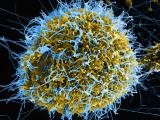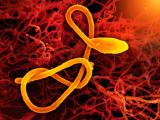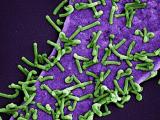Officials from World Health Organization (WHO) today said they're cautiously optimistic about curbing the spread of Ebola in the city Mbandaka, Democratic Republic of the Congo (DRC), adding that the next phase of the outbreak response will focus on two remote hot spots in Bikoro and Iboko, where most of the cases have been reported.
At a briefing in Geneva today live-streamed on the WHO's Twitter feed, health officials also said DRC's health ministry is finalizing protocols for testing five therapeutic treatments and that a trial of a second experimental Ebola vaccine—a prime-boost regimen developed by Johnson & Johnson—may take place in the outbreak setting.
Peter Salama, MD, the WHO's deputy director-general of emergency response, said that, as of May 27, 54 Ebola cases have been reported. The number includes 35 confirmed, 13 probable, and 6 suspected cases. So far 25 deaths have been reported.
Salama said the updated numbers add one suspected case in Wangata health zone, which is in Mbandaka. Tests have ruled out Ebola in three suspected cases, one from Ntondo health zone. Response teams are monitoring more than 900 contacts in the DRC's three hot spots.
Response in remote epicenters
Of the outbreak's 54 cases, 47 are from Bikoro and Iboko, Salama said. "That's where our priorities must be going forward." He said on Twitter yesterday that the WHO surged more staff over the weekend to respond to reports of increasing cases in Iboko.
More than 400 people have been immunized in a ring vaccination campaign in Mbandaka involving Merck's experimental VSV-EBOV vaccine that began on May 21, targeting contacts of Ebola cases, plus contacts of contacts. He said besides the city's large size, the initial response centered on the area because of the risk of spread to other parts of the DRC as well as two neighboring countries, the Republic of Congo and the Central African Republic.
Vaccination in the city went very smoothly, and so far there haven't been any reports of vaccine refusal, Salama said, adding that vaccinators have reached about 90% of the contacts targeted for immunization.
Though there is a 10-day window after vaccination before immunity kicks in, he said there hasn't been an explosion of cases in the city, a positive development that's part of what's fueling cautious optimism. Salama said there are three transmission chains in Mbandaka: one involving brothers who attended a funeral in Bikoro, one linked to a patient who visited a health center in Bikoro, and one who attended a community church gathering.
Now, it's time to battle the outbreak at its source, in Bikoro and Iboko, he said.
Michael Ryan, MD, the WHO's assistant director-general for emergency response, who just returned from the outbreak region, spoke of the huge logistical challenging in laying the groundwork for the response in the remote settings where most of the illnesses are occurring, but he said he is encouraged by the response he saw to the vaccination campaign in Mbandaka. "It's the first time in my experience where walking into villages with the vaccine teams you see hope and not terror," he said.
Doctors Without Borders (MSF) said today that it started vaccinating healthcare workers yesterday in Bikoro and that immunization will be offered to contacts of patients as part of the ring vaccination approach.
The group said the vaccine is one element of a larger strategy to control the spread of Ebola.
Micaela Serafini, MD, MPH, MSF's medical director in Geneva, said the group will be closely monitoring people who are voluntarily vaccinated and that, based on results in Guinea's outbreak, officials are confident about its use in the current outbreak. "The results of the trial suggest that the vaccine will present a real benefit to people at high risk of contracting Ebola, protecting them against the infection," she said.
Salama said vaccination is slated to begin this week in Iboko.
Opportunity to test treatments
The DRC government is eager to begin using experimental treatments in Ebola treatment units, and Salama said the programs and their companion clinical trials will likely begin in the coming days. They include ZMapp (a monoclonal antibody cocktail), Remdesivir (an antiviral), Regeneron (a monoclonal antibody treatment), favipiravir (a small-molecule antiviral), and a monoclonal antibody known as 114.
He said that doing clinical trials, especially in the remote settings, will be a challenge, given that some of the drugs involved intravenous administration over 6 to 12 hours and daily assessment of kidney and liver function.
Salama said the trials, done under the auspices of the health ministry, will, it is hoped, test the efficacy of all five drugs and assess how they compare to each other.
"If we don't use the opportunity to learn in this situation, we'll never be able to know which is better," he said.
Research on a second vaccine?
Salama said one of the critical questions researchers hope to answer with current trials under way as part of ring vaccination with VSV-EBOV is duration of protection. He said data from the trial in Guinea suggest the vaccine's protection lasts well over a year, and health officials suspect it might last much longer than that.
He said officials are exploring, along with the DRC government, if there's an opportunity to test whether another vaccine that works in a different way has the potential to protect for an even longer period.
The second vaccine approach, part of a prime-boost strategy, involves a dose of the adenovirus vectored Ad26.ZEBOV developed by Johnson & Johnson and a dose of MVA-BN-Filo from Bavarian Nordic.
See also:
WHO Twitter feed
May 29 MSF press release

















